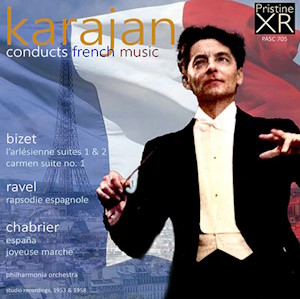
Georges Bizet (1838-1875)
L’Arlésienne: Suite No 1 (1872)
L’Arlésienne: Suite No 2 (1876)
Carmen: Suite No 1 (1873-4)
Maurice Ravel (1875-1937)
Rapsodie espagnole (1907-8)
Emmanuel Chabrier (1841-1894)
España (1883)
Joyeuse marche (1888)
Philharmonia Orchestra/Herbert von Karajan
rec. July 1953 (Ravel, Chabrier), January 1958 (Bizet), Kingsway Hall, London, UK
Pristine Audio PASC705 [71]
Unusually for Pristine Audio, the material on this program all received fairly wide circulation – I remember the U.S. early-stereo Angel LP of the three Bizet suites. Of course, where the documentary imperative is concerned, Andrew Rose’s top-quality remasterings don’t hurt. The monaural recordings, surprisingly, come up best: I’m still unsure of what Mr. Rose’s “Ambient Stereo” processing entails, but the monaural Ravel and Chabrier do suggest left-to-right spatial distribution, and even a modicum of depth on brass chords.
The two Chabrier items, hardly Karajan’s normal line of territory, are first-class. The bright-eyed España moves along perhaps too quickly, running roughshod over the characteristic Spanish 3/4-6/8 interplay, but the enthusiasm is infectious: the conductor sounds as if he’s having a grand old time. The Joyeuse Marche is bright and alert, here and there, the themes ought to have been profiled in sharper relief – Eugene Ormandy (Sony) is still my touchstone here – but Karajan expertly balances lightness and tonal weight.
Karajan plays the Rapsodie espagnole, which comes up clean and focused, straightforwardly. The low pizzicatos at the Malagueña‘s start are rhythmically alert. Smooth string textures, not slow tempi, suggest languor in a flowing Habanera (sic – no tilde!). The closing Feria is quite rapid, but the Philharmonia woodwinds manage their crisp articulations with aplomb, and the tuttis are nice and splashy. Only a few smudged details in the Prélude à la nuit and a brief stretch of slurry playing in the home stretch presage the precious Karajan to come.
About the Bizet, I’m less convinced. The conductor would return to the L’Arlésienne in both analogue and digital for DG, plus an additional outing of the second suite for EMI’s Karajan in Paris album. Some passages, especially in the First Suite, are utterly right: the incisive, no-nonsense start to the Prélude; the sensitively phrased saxophone solo; the proclamatory horns launching the too-brisk Carillon. But the “B” section of the Pastorale is leaden – Karajan must not have known any French or Spanish peasants – and the Intermezzo‘s opening lumbers. The Farandole moves along, but the trombones – of all instruments – are too restrained.
We also get hints of the laissez-faire ensemble that would increasingly dominate Karajan’s work. The start of the Carillon‘s “B” section is untidy, not immediately coördinating, and the upper strings have trouble keeping the Intermezzo‘s accompaniment together. Adding insult to injury, for all the excellence of Mr. Rose’s remastering, the pianos remain as dim as they were on the Angel LP; I suppose it’s good to know that the murk was there in the original tapes.
Karajan completists will want this, for the Ravel and Chabrier selections; others can safely skip it. Bizet is misidentified as Berlioz on the disc and in the notes, though the cover’s right; since Pristine is in the process of discontinuing “hard” CD issues, however, the point may be moot.
Stephen Francis Vasta
stevedisque.wordpress.com/blog
Availability: Pristine Classical


















